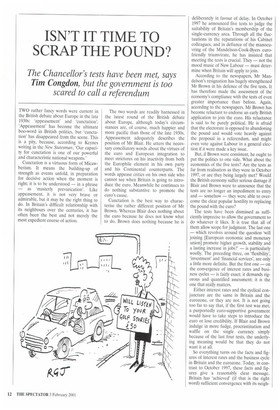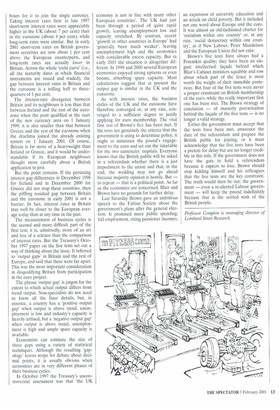ISN'T IT TIME TO SCRAP THE POUND?
The Chancellor's tests have been met, says
Tim Congdon, but the government is too
scared to call a referendum
TWO rather fancy words were current in the British debate about Europe in the late 1930s: 'appeasement' and `cunctation'. 'Appeasement' has become the ultimate boo-word in British politics, but `cunctation' has disappeared from the scene. This is a pity, because, according to Keynes writing in the New Statesman, 'Our capacity for cunctation is one of our powerful and characteristic national weapons.'
Cunctation is a virtuous form of Micawberism. It means the building-up of strength as events unfold, in preparation for decisive action when the moment is right; it is to be understood — in a phrase — as 'masterly prevarication'. Like appeasement, it is not very brave or admirable, but it may be the right thing to do. In Britain's difficult relationship with its neighbours over the centuries, it has often been the best and not merely the most expedient course of action. The two words are readily harnessed in the latest round of the British debate about Europe, although today's circumstances are, of course, much happier and more pacific than those of the late 1930s. Appeasement adequately describes the position of Mr Blair. He utters the necessary conciliatory words about the virtues of the euro and European integration to meet strictures on his inactivity from both the Europhile element in his own party and his Continental counterparts. The words appease critics on his own side who cannot see when Britain is going to introduce the euro. Meanwhile he continues to do nothing substantive to promote the euro's cause.
Cunctation is the best way to characterise the rather different position of Mr Brown. Whereas Blair does nothing about the euro because he does not know what to do, Brown does nothing because he is deliberately in favour of delay. In October 1997 he announced five tests to judge the suitability of Britain's membership of the single-currency area. Through all the fluctuations in the reputations of his Cabinet colleagues, and in defiance of the manoeuvring of the Mandelson-Cook-Byers eurofriendly triumvirate, he has insisted that meeting the tests is crucial. They — not the mood music of New Labour — must determine when Britain will apply to join.
According to the newspapers, Mr Mandelson's resignation has hugely strengthened Mr Brown in his defence of the five tests. It has therefore made the assessment of the economy's compliance with the tests of even greater importance than before. Again, according to the newspapers, Mr Brown has become reluctant to endorse an early British application to join the euro. His reluctance is said to be purely political. He is afraid that the electorate is opposed to abandoning the pound and would vote heavily against the proposal in a referendum, and might even vote against Labour in a general election if it were made a key issue.
But, if Brown were consistent, he ought to put the politics to one side. What about the economics of the five tests? Are the tests as far from realisation as they were in October 1997, or are they being largely met? Would the British economy suffer serious damage if Blair and Brown were to announce that the tests are no longer an impediment to entry and — somehow — they were able to overcome the clear popular hostility to replacing the pound with the euro?
The tests have been dismissed as sufficiently imprecise to allow the government to do whatever it likes. It is true that all of them allow scope for judgment. The last one — which revolves around the question 'will joining [European economic and monetary union] promote higher growth, stability and a lasting increase in jobs?' — is particularly woolly. The preceding three, on 'flexibility', 'investment' and 'financial services', are only a little more definite. But the first one — on the convergence of interest rates and business cycles — is fairly exact; it demands rigorous and quantified assessment; it is the one that really matters.
Either interest rates and the cyclical conjuncture are the same in Britain and the eurozone, or they are not. It is not going too far to say that, if the first test was met, a purportedly euro-supportive government would have to take steps to introduce the euro or lose credibility. If Blair and Brown indulge in more fudge, procrastination and waffle on the single currency simply because of the last four tests, the underlying meaning would be that they do not want it at all.
So everything turns on the facts and figures of interest rates and the business cycle in Britain and the eurozone. Today, in contrast to October 1997, these facts and figures give a reasonably clear message. Britain has 'achieved' (if that is the right word) sufficient convergence with its neigh
bours for it to join the single currency. Taking interest rates first: in late 1997 short-term interest rates were appreciably higher in the UK (about 7 per cent) than in the eurozone (about 4 per cent), while long-term rates were similar. But in early 2001 short-term rates on British government securities are now about 1 per cent above the European counterparts, and long-term rates are actually lower in Britain. Across the whole 'yield curve' (i.e., all the maturity dates at which financial instruments are issued and traded), the gap between interest rates in Britain and the eurozone is a trifling half to threequarters of 1 per cent.
The interest-rate divergence between Britain and its neighbours is less than that between Ireland and the rest of the eurozone when the punt qualified at the start of the new currency area on 1 January 1999; it is also smaller than that between Greece and the rest of the eurozone when the drachma joined the already existing system on 1 January 2001. Of course, Britain is far more of a heavyweight than Ireland or Greece, and it would be understandable if its European neighbours thought more carefully about a British application to join.
But the point remains. If the persisting interest gap differences in December 1998 for Ireland and in December 2000 for Greece did not stop these countries, then the piffling residual gap between Britain and the eurozone in early 2001 is not a barrier. In fact, interest rates in Britain may well be closer to the European average today than at any time in the past.
The measurement of business cycles is the second and more difficult part of the first test; it is, admittedly, more of an art and less of a science than the comparison of interest rates. But the Treasury's October 1997 paper on the five tests set out a way of thinking about the issue. It referred to 'output gaps' in Britain and the rest of Europe, and said that these were far apart. This was the most important consideration in disqualifying Britain from participation in the euro project.
The phrase 'output gap' is jargon for the extent to which actual output differs from trend output. Non-specialists do not need to know all the finer details, but, in essence, a country has a 'positive output gap" when output is above trend, unemployment is low and industry's capacity is heavily utilised, but a 'negative output gap' when output is above trend, unemployment is high and ample spare capacity is available.
Economists can estimate the size of these gaps using a variety of statistical techniques. Although the resulting 'gapology' leaves scope for debate about decimal points, it is usually obvious when economies are in very different phases of their business cycles.
In October 1997 the Treasury's uncontroversial assessment was that 'the UK economy is not in line with many other European countries'. The UK had just been through a period of quite rapid growth, leaving unemployment low and capacity stretched. By contrast, recent 'growth in other countries in Europe' had 'generally been much weaker', leaving unemployment high and the economies with considerable excess capacity. But in early 2001 the situation is altogether different. In 1999 and 2000 several European economies enjoyed strong upturns or even booms, absorbing spare capacity. Most calculations suggest that at present the output gap is similar in the UK and the eurozone.
As with interest rates, the business cycles of the UK and the eurozone have therefore converged or, at any rate, converged to a sufficient degree to justify applying for euro membership. The vital first test of Brown's five has been met. If the tests are genuinely the criteria that the government is using to determine policy, it ought to announce the pound's engagement to the euro and set out the timetable for the two currencies' nuptials. Everyone knows that the British public will be asked in a referendum whether there is a just impediment to the union and that, in the end, the wedding may not go ahead because majority opinion is hostile. But — to repeat — that is a political point. As far as the economics are concerned. Blair and Brown have no grounds for further delay.
Last Saturday Brown gave an ambitious speech to the Fabian Society about the government's plans after the general election. It promised more public spending, full employment, rising pensioner incomes, an expansion of university education and an attack on child poverty. But it included not one word about Europe and the euro. It was almost an old-fashioned charter for 'socialism within one country' or, at any rate, 'social democracy within one country', as if New Labour, Peter Mandelson and the European Union did not exist.
Brown's five tests have always had a Potemkin quality; they have been an elegant intellectual façade behind which Blair's Cabinet ministers squabble and row about which part of the fence is most worth the weight of their immobile posteriors. But four of the five tests were never a proper constraint on British membership of the euro, while the really important first one has been met. The Brown strategy of cunctation — of masterly prevarication behind the façade of the five tests — is no longer a valid strategy.
Either the government must accept that the tests have been met, announce the date of the referendum and prepare the British public for joining, or it must acknowledge that the five tests have been a pretext for delay but are no longer credible in this role. If the government does not have the guts to hold a referendum because it expects to lose, Brown should stop kidding himself and his colleagues that the five tests are the key constraint. The truth would then be out: the government — even a re-elected Labour government — will keep the pound indefinitely because that is the settled wish of the British people.
Professor Congdon is managing director of Lombard Street Research.



























































 Previous page
Previous page